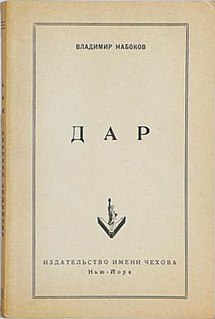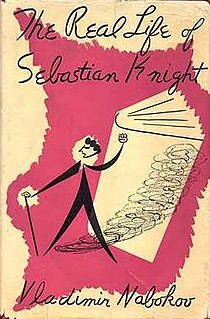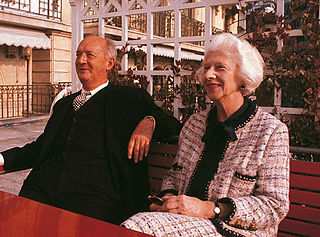
Pnin is Vladimir Nabokov's 13th novel and his fourth written in English; it was published in 1957. The success of Pnin in the United States launched Nabokov's career into literary prominence. Its eponymous protagonist, Timofey Pavlovich Pnin, is a Russian-born assistant professor in his 50s living in the United States, whose character is believed to be based partially on the life of both Nabokov's colleague Marc Szeftel as well as on Nabokov himself. Exiled by the Russian Revolution and what he calls the "Hitler war", Pnin teaches Russian at the fictional Waindell College, loosely inspired by Cornell University and Wellesley College—places where Nabokov himself taught.

Ada, or Ardor: A Family Chronicle is a novel by Vladimir Nabokov published in 1969.
"The Vane Sisters" is a short story by Vladimir Nabokov, written in March 1951. It is famous for providing one of the most extreme examples of an unreliable narrator. It was first published in the Winter 1958 issue of The Hudson Review and then reprinted in Encounter during 1959. The story was included in Nabokov's Quartet (1966), Nabokov's Congeries, Tyrants Destroyed and Other Stories (1975), and The Stories of Vladimir Nabokov (1995).

The Gift is Vladimir Nabokov's final Russian novel, and is considered to be his farewell to the world he was leaving behind. Nabokov wrote it between 1935 and 1937 while living in Berlin, and it was published in serial form under his nom de plume, Vladimir Sirin.
Brian Boyd is a professor of literature known primarily as an expert on the life and works of author Vladimir Nabokov and on literature and evolution. He is a University Distinguished Professor in the Department of English at the University of Auckland, New Zealand.

Invitation to a Beheading is a novel by Russian American author Vladimir Nabokov. It was originally published in Russian from 1935 to 1936 as a serial in Sovremennye zapiski, a Russian émigré magazine. In 1938, the work was published in Paris, with an English translation following in 1959. The novel was translated into English by Nabokov's son, Dmitri Nabokov, under the author's supervision.
"Signs and Symbols" is a short story by Vladimir Nabokov, written in English and first published, May 15, 1948 in The New Yorker and then in Nabokov's Dozen.

The Real Life of Sebastian Knight is the first English language novel by Vladimir Nabokov, written from late 1938 to early 1939 in Paris and first published in 1941. A work centred on language and its inability to convey any satisfactory definition, it has been identified as a forerunner of the postmodernist novel.

Look at the Harlequins! is a novel written by Vladimir Nabokov, first published in 1974. The work was Nabokov's final published novel before his death in 1977.

King, Queen, Knave is a novel written by Vladimir Nabokov, while living in Berlin and sojourning at resorts in the Baltic in 1928. It was published as Король, дама, валет in Russian in October of that year; the novel was translated into English by the author's son Dmitri Nabokov in 1968, forty years after its Russian debut.

Emilia is a character in the tragedy Othello by William Shakespeare. The character's origin is traced to the 1565 tale, "Un capitano Moro" from Giovanni Battista Giraldi Cinthio's Gli Hecatommithi. There, the character is described as young and virtuous, is referred to simply as the ensign's wife, and becomes Desdemona's companion in Cyprus. In Shakespeare, she is named Emilia, is the wife of Othello's ensign, Iago, and is an attendant to Othello's wife, Desdemona. While considered a minor character in the drama, she has been portrayed by several notable actresses on film, with Joyce Redman receiving an Academy Award nomination for her performance.

Véra Nabokov was the wife, editor, and translator of Russian writer Vladimir Nabokov, and a source of inspiration for many of his works.
"Spring in Fialta" is a short story written by Vladimir Nabokov in 1936, originally as Весна в Фиальте in Russian, during his exile in Berlin. The English translation was performed by Nabokov and Peter Pertzov. Spring in Fialta is included in Nine Stories and Nabokov's Dozen.

The Enchanter is a novella written by Vladimir Nabokov in Paris in 1939. As Волшебник (Volshebnik) it was his last work of fiction written in Russian. Nabokov never published it during his lifetime. After his death, his son Dmitri translated the novella into English in 1986 and it was published the following year. Its original Russian version became available in 1991. The story deals with the hebephilia of the protagonist and thus is linked to and presages the Lolita theme.
"Bachmann" is a short story written in Russian by Vladimir Nabokov under his nom-de-plume V. Sirin in Berlin in 1924. It was first published in Rul, a Russian émigré paper founded by his father, Vladimir Dmitrievich Nabokov, and later included in a number of short story collections: Vozvrashchenie Chorba, Tyrants Destroyed and Other Stories (1975), and The Stories of Vladimir Nabokov (1995). He and his son, Dmitri Nabokov, provided the English translation.
"The Return of Chorb" is a short story by Vladimir Nabokov written in Russian under his pen name Vladimir Sirin in Berlin in 1925. In 1929 it became part of a collection of fifteen short stories and twenty-four poems also called The Return of Chorb in Russian by "V. Sirin".

Lolita is a 1955 novel written by Russian-American novelist Vladimir Nabokov. The novel is notable for its controversial subject: the protagonist and unreliable narrator, a middle-aged literature professor under the pseudonym Humbert Humbert, is obsessed with a 12-year-old girl, Dolores Haze, whom he sexually abuses after he becomes her stepfather. "Lolita" is his private nickname for Dolores. The novel was originally written in English and first published in Paris in 1955 by Olympia Press. Later it was translated into Russian by Nabokov himself and published in New York City in 1967 by Phaedra Publishers.
Sounds is a short story by Russian American author Vladimir Nabokov originally written in Russian in September 1923.
"Music" is a short story by Russian American author Vladimir Nabokov originally published in Russian in 1932.

The Tragedy of Mister Morn is a verse drama by Russian novelist Vladimir Nabokov. The play is one of his first major works.











